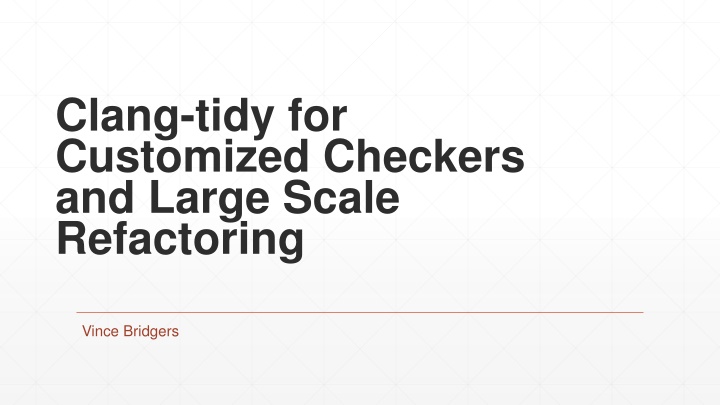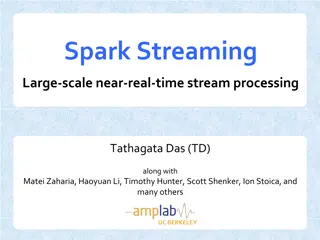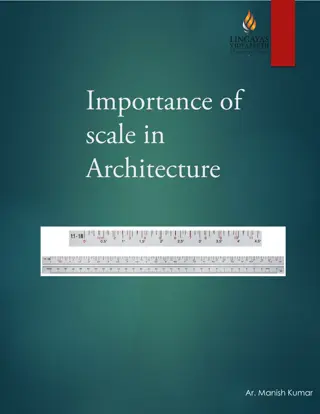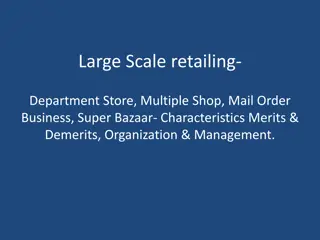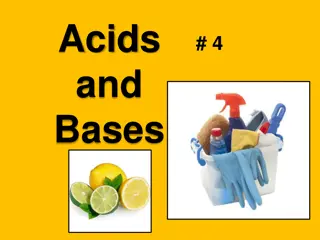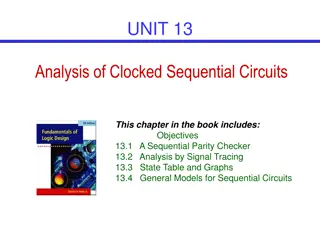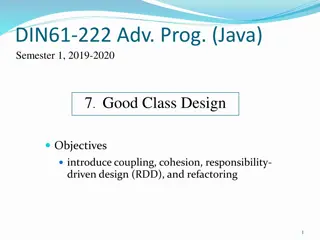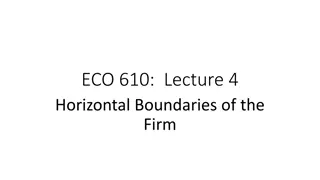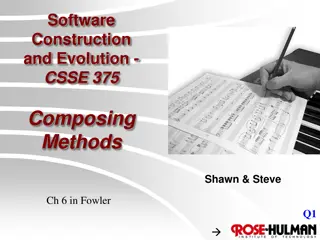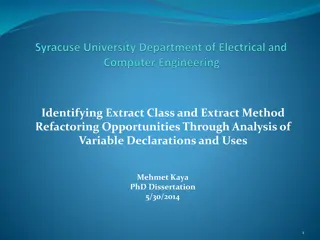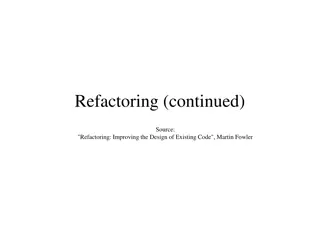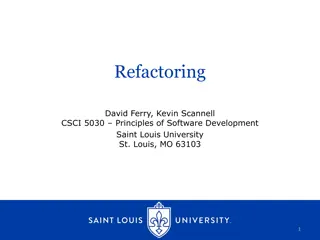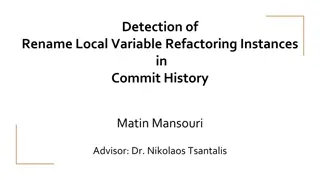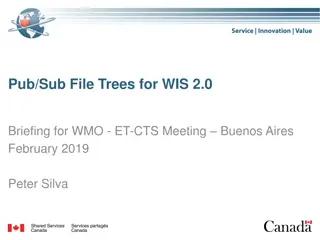Customized Checkers and Large Scale Refactoring
Dive into the world of Clang-tidy and its application for custom checkers creation and large-scale refactoring. Uncover powerful techniques, tips, and practices for enhancing code quality and maintainability. Explore how Vince Bridgers' insights can streamline your development process and elevate your software projects to new heights.
Download Presentation

Please find below an Image/Link to download the presentation.
The content on the website is provided AS IS for your information and personal use only. It may not be sold, licensed, or shared on other websites without obtaining consent from the author.If you encounter any issues during the download, it is possible that the publisher has removed the file from their server.
You are allowed to download the files provided on this website for personal or commercial use, subject to the condition that they are used lawfully. All files are the property of their respective owners.
The content on the website is provided AS IS for your information and personal use only. It may not be sold, licensed, or shared on other websites without obtaining consent from the author.
E N D
Presentation Transcript
Clang-tidy for Customized Checkers and Large Scale Refactoring Vince Bridgers
Overview Why use tools like Syntax and Static Analyzers? How do these tools fit into a process flow? Examples of text matchers using clang-query, compare and contrast with analysis Simple example clang-tidy check soup to nuts References for homework 2
Why tools like Clang-tidy?: Cost of Software Development Notice most bugs are introduced early in the development process, and are coding and design problems. Most bugs are found during unit test, where the cost is higher The cost of fixing bugs grow exponentially after release Conclusion: The earlier the bugs found, and more bugs found earlier in the development process translates to less cost Source: Applied Software Measurement, Caspers Jones, 1996
Four Pillars of Program Analysis Linters, style checkers Compiler diagnostics Static Analysis Dynamic Analysis Lint, clang-tidy, Clang-format, indent, sparse Yes Cppcheck, gcc 10+, clang Valgrind, gcc and clang Examples Clang, gcc, cl Not likely, but possible False positives No Yes Symbolic Execution Inner Workings Injection of runtime checks, library Text/AST matching Programmatic checks None Extra compile step Extra compile step Extra compile step, extended run times Compile and Runtime affects 4
Typical CI Loop with Automated Analysis Code Change Ready to commit Manual Code Review Automated Program Analysis Test Report coding errors Quick Feedback Syntax, Semantic, and Analysis Checks: Can analyze properties of code that cannot be tested (coding style)! Automates and offloads portions of manual code review Tightens up CI loop for many issues 5
LLVM/Clang Compiler Flow C/C++ Source code Source Code Front End Parser Clang AST Abstract Syntax Tree Optimizer Optimizer Code Generator Clang CodeGen Abstract Assembly Language LLVM IR https://www.youtube.com/watch?v=m8G_S5LwlTo LLVM IR Tutorial
Clang-tidy & Static Analyzers Compare and Contrast Clang Static Analysis uses Symbolic Execution Clang-tidy uses AST Matchers Finds patterns, optionally replace/add/remove patterns Both use the AST 7
AST Matcher compared to Symbolic Execution How to find all instances of possible division by zero before run time? binaryOperator(hasOperatorName("/"), hasRHS(integerLiteral(equals(0)).bind(KEY_NODE))); #define ZERO 0 int function(int b) { int a,c; switch (b){ case 1: a = b/0; break; case 2: a = b/ZERO; break; case 4: c = b-4; a = b/c; break; }; return a; } Found! Found! All preprocessor statements are resolved Not found by an AST matcher 8
Clang Static Analyzer Symbolic Execution switch(b) Finds bugs without running the code b: $b case 4 Path sensitive analysis default case 1 b: $b b: $b b: $b CFGs used to create exploded graphs of simulated control flows $b=[4,4] $b=[1,1] Return Garbage value c=b-4 Compiler warns here b: $b c: 0 int function(int b) { int a, c; switch (b) { case 1: a = b / 0; break; case 4: c = b 4; a = b/c; break; } return a; } a=b/0 $b=[4,4] b: $b a=b/c Divide by 0 Static Analyzer warns here b: $b c: 0 Divide by 0 Source: Clang Static Analysis - Gabor Horvath - Meeting C++ 2016
Clang-tidy Now with this perspective, shifting focus to clang-tidy A Clang based C++ Linting tool framework Full access to the AST and preprocessor Clang-tidy is extensible custom checks are possible More than 200 existing checks Readability, efficiency, correctness, modernization Highly configurable Can automatically fix the code in many place 10 See http://clang.llvm.org/extra/clang-tidy, list of checks here https://clang.llvm.org/extra/clang-tidy/checks/list.html.
Clang-tidy Quick Demo (demo1) Dump AST : clang cc1 ast-dump init.cpp clang-tidy list-checks clang-tidy list-checks checks=* clang-tidy --checks=-*,cppcoreguidelines-init-variables init.cpp -- clang-tidy --checks=-*,cppcoreguidelines-init-variables --fix init.cpp 11
Clang-tidy Uses Implement checks and changes that require semantic knowledge of the language Implement specialized checks for your organization Create acceptance tests for delivery of third-party work product Large scale refactoring Used by developers interactively during development & test Integration into your CI flow Automated and repeatable Moves subjectivity of the code review process to objective computer automation 12
Clang-tidy Notes Not all checkers have Fix s. See list of existing checkers for an example. Why would not all checkers have fixes? Some checks are not perfect, but good enough 80% rule. Highlight certain patterns for further scrutiny Custom checks Can pass compiler commands to the compiler, example clang-tidy --extra-arg="-DMY_SWEET_DEFINE=1" --checks=-*,cppcoreguidelines-init-variables init.cpp -- What s that -- at the end? Says that we re not using a compile_commands.json more on that later. 13 See http://clang.llvm.org/extra/clang-tidy, list of checks here https://clang.llvm.org/extra/clang-tidy/checks/list.html.
Clang-tidy check dev process Create New Checker Boilerplate ./add_new_check.py Identify Code to Check/Port Create Matcher Implement Checks Optional: Implement FixIt Done? Finished! 14
Imagine your manager wants a new API You have this cool new processor architecture that needs a special allocator because of a bug in first silicon (This has *never* happened before \\\ ). Change all instances of void *malloc(size_t) to void *acme_zalloc(size_t) in a test repo of about 10,000 files spread across maybe 50 directories. Don t look for a new job yet there s an opportunity to be a hero , get that cup of coffee bonus your manager pays out for extraordinary accomplishments Ok, maybe you really can do this with a simple shell or Python script but imagine this as a first step, and you don t know what other problems the hardware guys left in store for you. So, we ll use the clang tools Python script to create boilerplate for this 15
Clang-tidy Adding a Check (demo2) cd to <root>/clang-tools-extra/clang-tidy ./add_new_check.py misc change-malloc (See output) Rebuild Check listed checkers new one should show up! clang-tidy --list-checks checks=* | grep change To run the new checker (not yet though, we need a few changes) clang-tidy --checks=-*,misc-change-malloc file.c clang-tidy --checks=-*,misc-change-malloc --fix file.c 16
Well need to explore a code sample #include <stdlib.h> Our new implementation void *acme_zalloc(size_t s) { void *ptr = malloc(s); memset(ptr, 0, s); return ptr; } Don t touch this one (I ll show ya) void * foo(int s) { return malloc(s); } Change to acme_zalloc() Let s see what the AST looks like first (demo3) 17
Extending clang-tidy See https://clang.llvm.org/docs/LibASTMatchersReference.html Many existing matchers, and can be extended (subject for another day) If you re overwhelmed so far no worries! This *is* difficult. Hang in there, we ll go through some simple examples to get started. We re driving towards our simple tutorial example best place to start! 18
Clang AST for our sample (demo3) For demo purposes, I ll use this code, we ll come back to our manager s code #include <stdlib.h> #include <memory.h> int foo(void) { void *ptr = malloc(4); See references at the end for Intro to AST, and AST matchers. free(ptr); return 0; } I ll go through a few example explorations specific to the problem posed with some hints for optimizing your explorations. int fee(int i) { return i*2; } int gee(int i) { return i/2; } int anError(int i) { return i/0; } 19
Step 1: Replace malloc Most of the difficult work is done we have a basic matcher expression we can use. From our exploration Matcher -> callExpr(callee(functionDecl(hasName("malloc")))) How to translate to code? In our registerMatchers override void ChangeMallocCheck::registerMatchers(MatchFinder *Finder) { Finder->addMatcher(callExpr(callee(functionDecl(hasName("malloc")))).bind("malloc"),this); } This adds a matcher and binds to a name malloc for us to use in our check override. 20
Step 1: Replace malloc In our check override void ChangeMallocCheck::check(const MatchFinder::MatchResult &Result) { const CallExpr *callExpr = Result.Nodes.getNodeAs<CallExpr>("malloc"); if (callExpr) { auto start = callExpr->getBeginLoc(); auto Diag = diag(start, "use acme_zalloc() instead of malloc()") << FixItHint::CreateReplacement(SourceRange(start, start.getLocWithOffset(strlen("malloc")-1)), "acme_zalloc"); } } This code uses our match, and creates a replacement for malloc , with a diagnostic, and an optional fix What are these calls for Source Range and BeginLoc()? 21
Source location There exists methods to help with source replacement Each AST node has location associated with it that can be retrieved. I ll not spend too much time on this, but there s more to explore and learn here. Let s compile the example and try it out! 22
Step 2: If you give a mouse a cookie Someone discovered we need to change a few thousand files to use a new API This is contrived, I know please suspend logic for now, this is a tutorial after all Transform void *malloc(size_t) -> void *acme_zalloc(size_t, int) , and void free(void *) -> void acme_free(void **) . Let s assume all of our files include a single top level include that we can add new interface prototypes and defines too. First step extend the matchers void ChangeMallocCheck::registerMatchers(MatchFinder *Finder) { Finder->addMatcher(callExpr(callee(functionDecl(hasName("malloc")))).bind("malloc"),this); Finder->addMatcher(callExpr(callee(functionDecl(hasName( free")))).bind( free"),this); } 23
Step 2: Replace free, extend malloc void ChangeMallocCheck::check(const MatchFinder::MatchResult &Result) { SmallString<64> NewArgument; const CallExpr *callExpr = Result.Nodes.getNodeAs<CallExpr>("malloc"); if (callExpr) { auto start = callExpr->getBeginLoc(); auto Diag = diag(start, "use acme_zalloc() instead of malloc()") << FixItHint::CreateReplacement(SourceRange(start, start.getLocWithOffset(strlen("malloc")-1)), "acme_zalloc"); NewArgument = Twine(", ZERO_INITIALIZE").str(); const auto InsertNewArgument = FixItHint::CreateInsertion(callExpr->getEndLoc(), NewArgument); Diag << InsertNewArgument; } callExpr = Result.Nodes.getNodeAs<CallExpr>("free"); if (callExpr) { auto start = callExpr->getBeginLoc(); auto Diag = diag(start, "use acme_free() instead of free()") << FixItHint::CreateReplacement(SourceRange(start, start.getLocWithOffset(strlen("free")-1)), "acme_free"); Diag << FixItHint::CreateInsertion(callExpr->getArg(0)->getBeginLoc(), "(void **)&"); } } 24
Demo3 Repeat with new changes Rebuild, retry 25
Clang-tidy for Projects Examples shown so far are for clang-tidy for one file. What if we want to process multiple files across a source repo? h2.h h1.h file1.cpp, h1.h, and h2.h are modified first step. Then file2.cpp is modified, but could fail to compile properly. file1.cpp file2.cpp How to address? clang-tidy There is a solution! 26
Clang-tidy for Projects file1.cpp, h1.h, and h2.h are processed, and modifications stored in a yaml file. h2.h file2.cpp is processed, changes stored to a yaml file. h1.h file1.cpp file2.cpp clang-tidy Clang-tidy Replacements database 27
Clang-tidy for Projects The clang-apply-replacements tool will process the changes after clang-tidy is complete. h2.h No problem! h1.h clang-tidy/tool/run-clang-tidy.py Runs clang-tidy in parallel file1.cpp file2.cpp Can use matching patterns clang-apply Handles deferred replacements Clang-tidy Replacements database 28
Example Transforming Large Scale Project In this case cmake based. Cmake supports compile_commands.json generation. Application directory and library directory. Build: cd build & Top: CMakeLists.txt cmake -DCMAKE_EXPORT_COMPILE_COMMANDS=ON -G Ninja ../ appDemo Clang-tidy checks on project appLibrary run-clang-tidy.py -header-filter='.*' -checks='-*,misc-change-malloc Apply our fixes use fix build Avoid applying multiple fixes simultaneously use just one at a time, test, commit then repeat iteratively. 29 Compile commands JSON: https://sarcasm.github.io/notes/dev/compilation-database.html#how-to-generate-a-json-compilation-database
Example Transforming Large Scale Project Demo4 Top: CMakeLists.txt appDemo appLibrary build 30
Supporting LIT Test case // RUN: %check_clang_tidy %s misc-change-malloc %t void f() { void *p=malloc(1); // CHECK-MESSAGES: warning: use acme_zalloc() instead of malloc() [misc-change-malloc] // CHECK-FIXES: void *p=acme_zalloc(1, ZERO_INITIALIZE); free(p); // CHECK-MESSAGES: warning: use acme_free() instead of free() // CHECK-FIXES: acme_free((void **)&p); } We *always* want a supporting LIT test case for every new checker. Positive and *negative* use cases 31
Supporting LIT Test case Demo5 LIT test case 32
Conclusion Soup to nuts how to build a simple clang-tidy base checkers and refactoring tool. Not covered today Preprocessor callbacks, adding include files Lot s to explore! Resources in the references Try clang-query using different source examples. Get creative with AST matcher expressions. Improve the LIT tests presented Try adding your own category of checkers (not inserted into misc ) 33
References Introduction to the Clang AST - https://clang.llvm.org/docs/IntroductionToTheClangAST.html Matching the Clang AST - https://clang.llvm.org/docs/LibASTMatchers.html AST Matcher Reference - https://clang.llvm.org/docs/LibASTMatchersReference.html Stephen Kelly s blog - https://devblogs.microsoft.com/cppblog/author/stkellyms/, https://steveire.wordpress.com/ Tutorial source - https://github.com/vabridgers/LLVM-Virtual-Tutorial-2020.git The complete compile_commands.json reference - https://sarcasm.github.io/notes/dev/compilation- database.html See http://clang.llvm.org/extra/clang-tidy, list of checks here https://clang.llvm.org/extra/clang- tidy/checks/list.html 34
